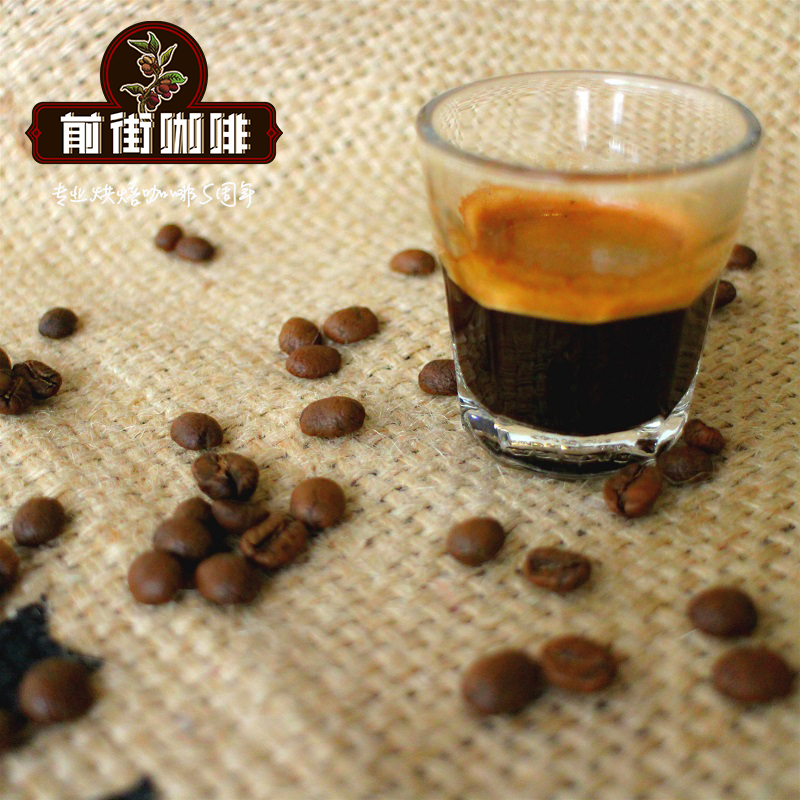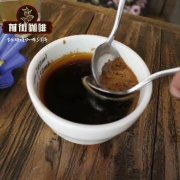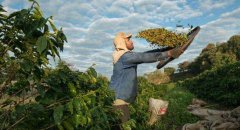Not the most expensive Blue Mountain Coffee, how to find out the authenticity of Blue Mountain Coffee beans?

Professional coffee knowledge exchange more coffee bean information please follow the coffee workshop (Wechat official account cafe_style)
The world-famous Blue Mountain Coffee, produced in the Blue Mountains of Jamaica, has been in short supply because of its low caffeine content (less than half of other coffees) and outstanding taste, catering to modern people's concept of healthy consumption.
Blue Mountain Coffee beans are known as "golden beans". They are only produced in the Blue Mountains in western Jamaica, which are more than 1800 meters above sea level. Here, the mountains are steep, the air is fresh, it rains all the year round, the temperature difference between day and night is great, and the unique new volcanic soil makes the coffee beans here slightly sour and mellow. The same coffee trees taste very different whether they are planted in Hawaii, Kenya, Papua New Guinea or anywhere else with a similar climate.
The most important coffee bean trading organization in the world is the International Coffee Organization (ICO), which has 50 members of exporting countries and controls 99 per cent of global coffee production. According to industry insiders, coffee beans traded through the International Coffee Organization have strict quotas, as do Blue Mountain coffee beans.
It is true that there are many blue mountain coffee beans in circulation in the international market. because of the advantage of quotas, countries such as Japan often process coffee beans and sell them to other countries and regions in the form of finely ground coffee powder or zero-point coffee beans. For example, enterprises in Singapore, Hong Kong and China buy blue mountain coffee beans from Japan every year.
The price of the real Blue Mountain coffee in the world is very high, at least more than US $40 per kilogram. If the real Blue Mountain coffee can be imported into China, the cost, freight, customs duties, production and operation costs of the coffee are definitely not less than NT $300 per cup.
The Blue Mountains, the birthplace of Coffee Beauty, is located in the eastern part of the island of Jamaica. Coffee trees are planted on the slopes of the mountains of Hengduan Jamaica, and the products are divided into three categories by region of production: A:BM (Blue Mountains); B:HM (Alpine); and C:PM (Braim, Ozshut). Among them, BM is the growing area of the world-famous Blue Mountain Coffee. British soldiers who once arrived in Jamaica saw that the peaks here were shrouded in blue light, so they called them blue mountains, hence the name "Blue Mountains."
Blue Mountains are located at latitudes 25 degrees north and 25 degrees south.
Between the coffee belt, there are fertile new volcanic soil, fresh air, no pollution, rainy all the year round, and a large temperature difference between day and night, which makes the taste and flavor of Blue Mountain coffee outstanding. According to the reporter's textual research, only coffee grown in the Blue Mountain area above 1800 meters above sea level can be called Blue Mountain Coffee. The same coffee tree species, whether planted in Hawaii, Kenya, Papua New Guinea or anywhere else with a similar climate, cannot produce the flavor of blue mountain coffee beans.
People who love Blue Mountain Coffee call it a "coffee beauty" that combines all the advantages of good coffee.
Jim, general manager of Pitt, which is famous for its coffee and tea business in the United States, said of Blue Mountain Coffee: "it tastes fragrant, smooth and mellow, and it makes me feel as precious as a gem. It is precisely because the taste of Blue Mountain coffee is moderate and perfect, so Blue Mountain coffee is generally drunk in the form of black coffee. "
However, due to the lack of strict coffee classification rules and industry standards in the world, and the fact that most consumers in China know little about coffee, in general, ordinary consumers have no way to distinguish between true and false. However, some people in the industry believe that the real Blue Mountain Coffee is not sour whether it is hot or cold, which is now the only experience that can distinguish between true and false.
The reason why Blue Mountain Coffee can be called the best in the world today is also related to the local management policy of Jamaica. Compared with Brazil, the largest coffee exporter in the world, which produces 30 million bags of coffee every year, Jamaica is a country with relatively low coffee production in the world. it is recognized that the blue mountain growing area of Jamaica is only 6000 hectares, and only about 40, 000 bags of blue mountain coffee are produced every year. In the end, only through a series of stringent standards set by the Jamaican Coffee Industry Authority can coffee obtain a guarantee issued by the government, officially known as "Blue Mountain".
Where does such an excellent and small amount of Blue Mountain Coffee end up in the world? According to the reporter's understanding, over the years, the Japanese government has invested a lot of money in Jamaica, taking almost the whole "coffee beauty" as its own. 85% and 90% of the Blue Mountain coffee produced by Jamaica every year is exported to Japan, and the remaining 10% to 15% is exported to a few countries in Europe and the United States.
As Blue Mountain Coffee is more common in Japan, its domestic Blue Mountain Coffee is retail and is not sold in bulk, let alone exported. At the same time, the amount of Blue Mountain Coffee in a few countries in Europe and the United States is also relatively small. It is almost impossible for other countries to import large quantities of Blue Mountain Coffee from Japan or Europe and the United States.
More than 70 per cent of coffee produced by Mavis Bank Central Factory is exported, most of which are clearly marked with M.B.C.F. In the coffee bucket. For decades, this trademark has been recognized as a symbol of high quality and has been pursued by connoisseurs and outstanding cafes around the world. The remaining 30% of the coffee is screened by professional coffee roasting masters and roasted moderately with great care. Due to consistency, hand selection and careful maintenance of each packaged coffee bean, the coffee with the Jablum-Jamaican Blue Mountain Coffee-logo represents perfection.
After asking the coffee master-Ke Mingchuan's reply
Now the producing area of Jamaican Blue Mountain Coffee is larger than before, and the consumption power of Japan has become weaker recently, so the real Jamaican Blue Mountain Coffee is also sold in other countries, and some people in China also import it, as long as they know how to identify it, they can buy the real thing.
In 1950, the country established the Jamaica Coffee Industry Council (Jamaica Coffee Industry Board), the only authorized export agency. After 1983, the Government, through the member, relaxed some of the requirements to allow producers up to the standard to sell on the market on their own.
This new regulation mainly amends two key points:
1. Clearly define the scope of the Blue Mountain, as shown in the attached picture. Therefore, the origin of Jamaican Blue Mountain Coffee refers to the Blue Mountain area with a height of more than one kilometer east of the capital Kingston.
two。 Define Wallenford, Silver Hill, Mavis Bank and Moy Hall and Langley as their approved processing farms (Coffee Works), and indicate that new treatment farms are approved by the minister from time to time.
As a result, there are now several suppliers of Jamaican Blue Mountain Coffee, and readers can find qualified exporters on the committee's website (http://www.jamaicancoffee.gov.jm/).
Some of these farms also produce other coffee beans, such as Jamaican high mountain beans (Jamaica High Mountain Supreme) and Jamaican premium beans (Jamaica Prime coffee), which are similar in name but not as delicious as certified Jamaican Blue Mountain coffee. Consumers should pay special attention when buying them.
As the popularity of Jamaica Blue Mountain Coffee is too high, there are many fake coffee on the market, such as Blue Mountain Coffee, Blue Mountain mixed Coffee, or directly called Blue Mountain Coffee. However, these operators mimic the taste of Jamaican Blue Mountain Coffee and mix all kinds of coffee beans by themselves, and the mixed coffee produced may not have a single real Jamaican Blue Mountain coffee bean in it.
Important Notice :
前街咖啡 FrontStreet Coffee has moved to new addredd:
FrontStreet Coffee Address: 315,Donghua East Road,GuangZhou
Tel:020 38364473
- Prev

Why is there no pure Blue Mountain Coffee on the market?
Professional coffee knowledge exchange more coffee bean information Please pay attention to the coffee workshop (Wechat official account cafe_style) there is no pure Blue Mountain coffee on the market because there is no direct import of Blue Mountain coffee beans the world-famous Blue Mountain Coffee, produced in the Blue Mountain Mountains of Jamaica, because the caffeine content is very low (less than half of other coffee), coupled with outstanding taste, cater to
- Next

Sumatra develops a unique wet planing method
Except Manning English Mandheling is very special. Manning coffee raw beans also have their own special and unique global characteristics, that is, wet planing (wet-hulled) treatment. The treatment plant buys raw coffee beans with initially removed peel, pulp and moist seed shell (along with pectin residue) from coffee farmers, then further dry to about 50% water content.
Related
- Detailed explanation of Jadeite planting Land in Panamanian Jadeite Manor introduction to the grading system of Jadeite competitive bidding, Red bid, Green bid and Rose Summer
- Story of Coffee planting in Brenka region of Costa Rica Stonehenge Manor anaerobic heavy honey treatment of flavor mouth
- What's on the barrel of Blue Mountain Coffee beans?
- Can American coffee also pull flowers? How to use hot American style to pull out a good-looking pattern?
- Can you make a cold extract with coffee beans? What is the right proportion for cold-extracted coffee formula?
- Indonesian PWN Gold Mandrine Coffee Origin Features Flavor How to Chong? Mandolin coffee is American.
- A brief introduction to the flavor characteristics of Brazilian yellow bourbon coffee beans
- What is the effect of different water quality on the flavor of cold-extracted coffee? What kind of water is best for brewing coffee?
- Why do you think of Rose Summer whenever you mention Panamanian coffee?
- Introduction to the characteristics of authentic blue mountain coffee bean producing areas? What is the CIB Coffee Authority in Jamaica?

